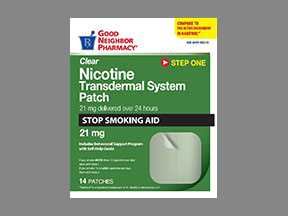
Nicotine Coupons & Savings Card – Discount Prices from $21.10
Generic for: Habitrol, Nicotrol ns, Nicoderm cq
Our coupons are free to use. Before paying, show the pharmacist your Nicotine savings card to get your free discount. Use our filters below to edit the prescription box to match your needs. The Nicotine prices will update based on your prescription needs. Above our Nicotine coupons, you can change your location to see pharmacy prices and costs in other areas. We're here to help you buy Nicotine at the lowest price with our prescription discount card.
My prescription
Edit
21MG/24HR, Nicotine (28 Patch 24 Hours)
Select pharmacy

Walgreens
$21.10
COUPON PRICE
Albertsons
$48.76
COUPON PRICENicotine savings card
Show this card to your pharmacist
Walgreens
$21.10
BIN
ID
PCN
GRP
015995
LHKPX293765
GDC
DR33
Powered by
Our coupons are free to use. Before paying, show the pharmacist your Nicotine savings card to get your free discount. Use our filters below to edit the prescription box to match your needs. The Nicotine prices will update based on your prescription needs. Above our Nicotine coupons, you can change your location to see pharmacy prices and costs in other areas. We're here to help you buy Nicotine at the lowest price with our prescription discount card.
